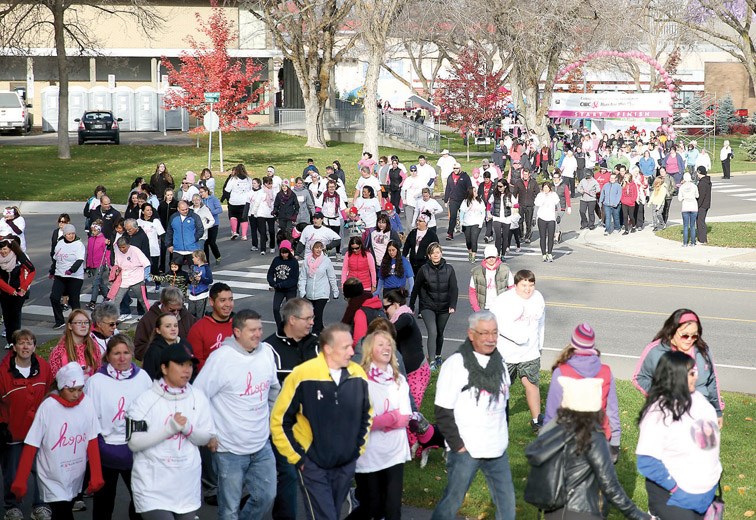Three years ago, Viva Swanson had breast cancer for six days, she says.
After that, it was all about making sure it would never come back.
Swanson will share her inspiring story on Sunday during the opening ceremony of the CIBC Run for the Cure, which will begin at Lheidli T'enneh Memorial Park at 9:30 a.m. There is an option to walk or run one or five kilometres.
Swanson grew up in Prince George, graduated from Kelly Road Secondary School and took her nurse training at the College of New Caledonia, graduating in 1989. After working in maternity care for many years, she moved into administration and currently lives in Fort St. John, working in corporate services as a leadership development advisor for Northern Health.
Swanson still has family living in Prince George and will return Sunday to run the five kilometres for the first time in her life.
She followed the 'from the couch to five kilometres in 10 weeks' training program.
"And it tells me that on Sunday I will be able to complete the run without stopping," Swanson said.
Looking back on surviving cancer, she said it was a fluke that she was diagnosed so early.
"We couldn't feel the tumour, we couldn't see the tumour during a mammogram, but I had a little cyst that was completely unrelated," she added.
Her husband Randy told her that even though it seemed like something small that she should probably get the cyst checked out.
"I was a little bit arrogant in thinking that I'm a nurse and I know my boobs better than anybody," Swanson said. "In the course of one day - I was at my family doctor at 9 a.m., had my mammogram at 2 p.m., and an ultrasound at 3. The tumour wasn't glaringly obvious."
It took the ultrasound technician exploring her armpit area to discover a lymph node that was completely round, which is not normal. They are supposed to be oval or tear-drop shaped, Swanson said.
"She literally dug for about 20 minutes before she found the mass," she added.
"Half an hour later I had it biopsied and by 4:30 I was back at my doctor's office with a speculative diagnosis as the radiologist said that the odds of it not being cancer was slim to none.
"So it all happened in a day, which was incredible."
Swanson said the defining moment, when she realized that this might be something serious, took place as she was lying on the ultrasound bed and was left with her own thoughts for a time.
"I had this sensation of holy cow - is this the first second of the first minute of the first day of the rest of my life? The end of my life? Is this really happening?" Swanson said.
Because the process was so seamless and Swanson didn't have to wait for the ultrasound, the biopsy or diagnosis, it somehow made her feel better about the whole thing.
"I had this overwhelming sensation that everything was going to be OK," Swanson said.
Historically, Swanson said that whenever a life-altering event was coming up, she would get a sense of foreboding.
"In this case I had nothing like that at all so I was just going with my gut and thought this was just part of the adventure and death and dying never crossed my mind, to be quite honest," Swanson said.
Swanson said quite literally she had cancer for six days.
"I was diagnosed on Friday, April 10, 2015 and I had my lumpectomy on April 16 and it was gone," Swanson said.
Follow-up included adjuvant therapy, which includes chemotherapy and radiation to help decrease the risk of the cancer recurring.
"So I had 24 weeks of chemotherapy and four weeks of radiation," Swanson said. "And it was awesome. I know, that's wacked, right? Obviously, I hadn't been taking any hints about slowing life down to smell the roses and apparently the only way I was going to do it was with a big message, which was the diagnosis of breast cancer. I had to take a breath and just be so grateful for my life, my family, my community, for my career and understanding all the blessings and having this diagnosis at this time."
Swanson explained that in this day and age where a breast cancer diagnosis is not a death sentence, where the protocol has been fine-tuned and survival rate has improved so greatly, it's a good place to be if you have to get the disease.
"I know people think I'm crazy but I know that I am a better person for the experience," Swanson said.
One in eight Canadian women is expected to be diagnosed with breast cancer in her lifetime. Since 1992 the CIBC Run for the Cure has raised more than $430 million for breast cancer research, support programs, health education and advocacy initiatives. Last year's event raised $17 million and included about 80,000 participants across the nation.
For more information or to donate visit www.cancer.ca and click on events to find the Prince George Run for the Cure.



